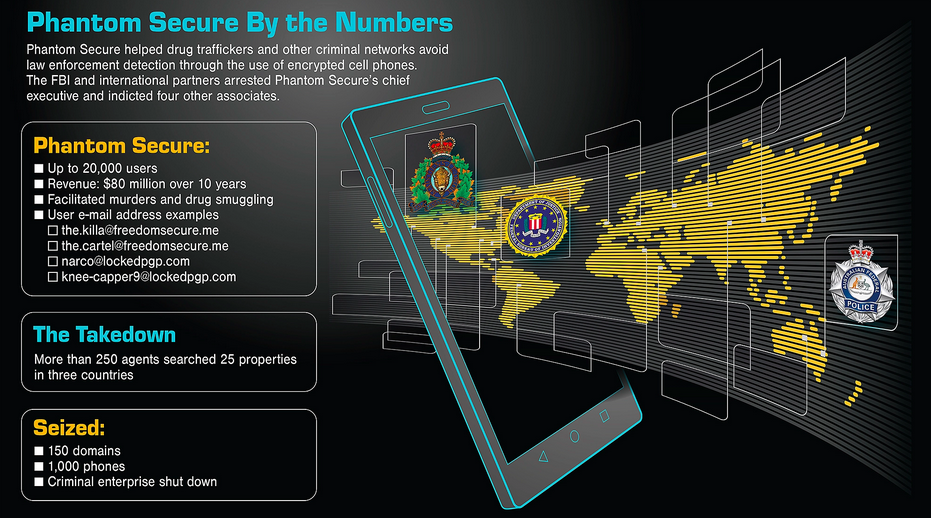The arrest of a senior RCMP official was the fruit of a 2018 international police operation that targeted the encrypted communications service Phantom Secure, sources have told Global News.

An outfit that sold untraceable smartphones to criminals so they could evade police, Phantom Secure was dismantled last year by authorities in the U.S., Canada, Australia, Hong Kong and Thailand.
The arrest of Phantom Secure CEO Vincent Ramos in Washington State in March 2018 led police to sensitive RCMP information that had been offered up for sale, according to the sources.
While Ramos did not know the identity of the person allegedly brokering the RCMP information, Canadian investigators traced it to a list of suspects who had access to it, the sources said.
On Thursday, the RCMP arrested one of its own at the national headquarters building near Ottawa. Cameron Ortis faces seven charges, including obtaining information to pass to a “foreign entity.”
Ortis was director general of the National Intelligence Coordination Centre. During 12 years as a civilian member of the RCMP, he had worked in Operations Research and National Security Criminal Investigations.
“By virtue of the positions he held, Mr. Ortis had access to information the Canadian intelligence community possessed. He also had access to intelligence coming from our allies both domestically and internationally,” RCMP Commissioner Brenda Lucki said Monday.
The charges have “shaken many people throughout the RCMP,” she said in a statement, adding the police force was “assessing the impacts of the alleged activities as information becomes available.”
“We are aware of the potential risk to agency operations of our partners in Canada and abroad and we thank them for their continued collaboration. We assure you that mitigation strategies are being put in place as required.”
The details of the allegations have not been publicly disclosed, and the charges against Ortis have not been proven in court.
But sources told Global News the investigation began with the Phantom Secure case and the arrest of Ramos, 41, a Canadian serving a 108-month sentence in a Texas prison.
Phantom Secure bought smartphones, stripped them of their functions and installed an encrypted email system so the phones could only communicate with each other, according to the FBI.

Get daily National news
The phones had 10,000 to 20,000 users, many of them “top-level” organized crime leaders, said police, who claimed the phones were used to co-ordinate drug trafficking, murders and money-laundering.
The arrest of Ramos marked the first time the U.S. had targeted a company for helping organized crime through the supply of encryption technology, and was billed as a major blow against criminal networks’ use of encryption.
The investigation included information from confidential sources from Australia and the U.S., and evidence from “numerous co-operating witnesses,” including transnational drug traffickers.
Starting in March 2015, RCMP undercovers posing as drug traffickers were able to infiltrate the criminal network by purchasing Phantom Secure devices and discussing their drug trafficking capabilities.
According to court documents, the RCMP worked with the FBI on the undercover sting targeting Ramos.
WATCH: RCMP official charged with security leak may affect allies’ trust in Canada’s security establishment, Carvin says

One RCMP undercover asked a Ramos employee if data on his device could be erased remotely – a service offered by the high-tech firm.
The undercover said one of his associates had been arrested and “he picked up the load (of drugs) and I think he’s been arrested and I need – there’s a lot of evidence and f—– sh-t in my Blackberry … I need that evidence gone ASAP.”
“You wanna wipe both of them?” the employee said. “OK then.”
In another case, Ramos acknowledged to undercover officers in Las Vegas that cartels could track their own employees through GPS devices installed in Phantom Secure phones, according to the court records.
An agent responded that GPS in the device would “locate and kill the informant,” the affidavit says.
“Yeah, it does,” Ramos responded, according to the FBI arrest affidavit.
Ramos pleaded guilty to one count of racketeering conspiracy, admitting Phantom Secure used servers in Panama and Hong Kong “to stay out of reach of law enforcement of the United States.”
The plea agreement said clients needed a personal reference and those engaged in international drug trafficking were referred to as “executives.” When users were arrested, the company would delete their phones.
All other charges were withdrawn.
Three of the charges against the RCMP official date back to before the arrest of Ramos, including one that alleges that in 2015 Ortis did “intentionally and without authority, communicate special operational information” in violation of the Security of Information Act.
WATCH: Prosecutor outlines charges against high-level RCMP official

Bill Majcher, a former RCMP officer with years of experience in undercover work targeting transnational drug traffickers, said he never worked with Ortis, but had watched him rise quickly through the ranks at B.C. RCMP’s E-Division headquarters.
From his position as director general of intelligence in Ottawa, Ortis would have been able to access almost any sensitive information he wanted, Majcher said.
This could include the force’s blueprints for covert operations worldwide, as well as the identities of undercover officers, police agents working within transnational crime groups, officers from Five Eyes partners used in RCMP probes, and even witnesses relocated to other countries.
“He could have passed on our methodologies, our tactics, and our whole covert infrastructure,” Majcher said. “If it is true that he is dealing with some of the worst people in the world, they will be looking for what do the police know, how do they do stings on us?
“The damage he has potentially done could be quite massive and it could be generational.”
WATCH: RCMP intelligence director charged, accused of violating national secrets act

Sources said Ortis rose extremely rapidly in the RCMP, apparently because of his deep knowledge of information security in cyberspace, and the vulnerabilities posed by collaboration between organized crime and intelligence agents in places like East Asia and Russia.
In his 2006 graduate thesis at the University of British Columbia, Ortis explored security vulnerabilities from “compromised nodes” in cyberspace, the “digital black market” and connections between gangsters and hackers in Hong Kong and Shenzen, China.
“Is transnational organized crime a threat to state security in the digital age?” Ortis wrote. “This chapter introduces that concept of a nexus between two previously distinct, hidden networks: systems intruders and transnational organized crime.”









Comments